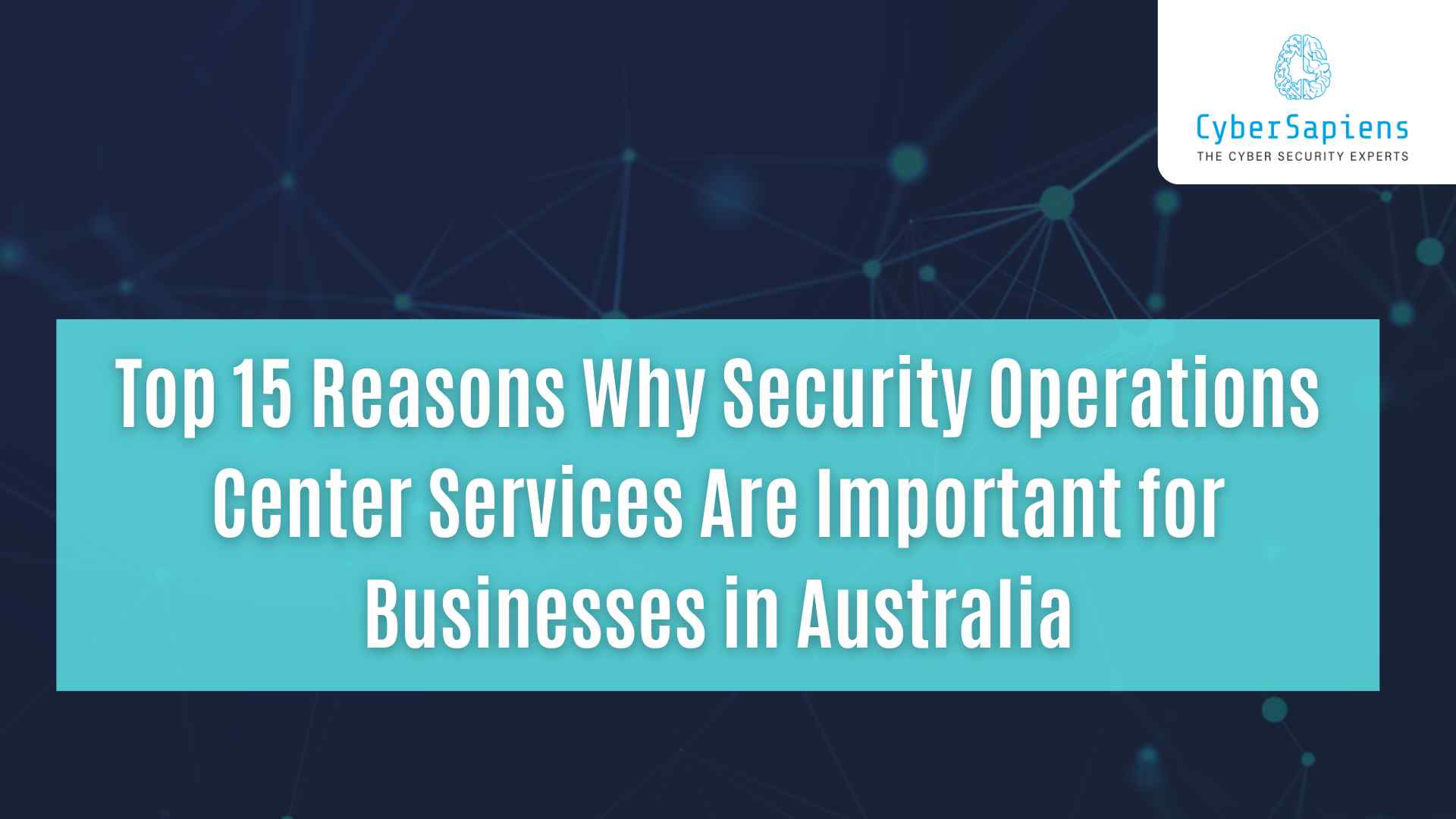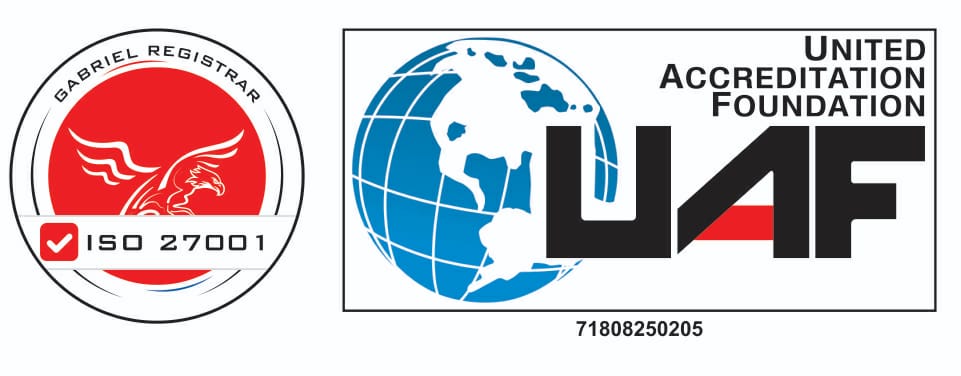cybersecurity threats are becoming increasingly common and sophisticated, posing significant risks to businesses of all sizes and industries.
The ever-evolving threat landscape, coupled with the complexity of modern IT systems, makes it challenging for companies to protect themselves against cyber-attacks effectively. This is where Security Operations Center (SOC) services come into play. A SOC is a centralized unit that continuously monitors and analyzes an organization’s security-related data to identify, contain, and respond to potential security threats.
SOC services have become essential for businesses in Australia, as they provide an additional layer of defence against cyber-attacks and help mitigate potential losses. Here are the Top 15 Reasons Why Security Operations Center Services Are Important For Businesses In Australia:
List of Top 15 Reasons Why Security Operations Center Services Are Important For Businesses In Australia
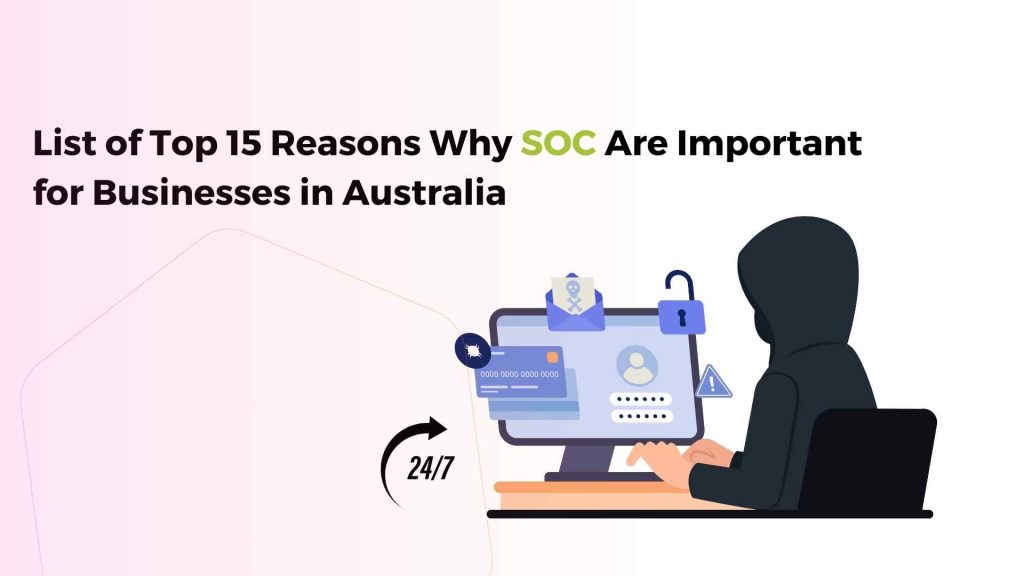
Here is the list of the Top 15 Reasons Why Security Operations Center Services Are Important For Businesses In Australia:
1. Enhanced Threat Detection
A SOC uses advanced threat detection tools and techniques to identify potential security threats in real time, allowing for swift response and minimizing the risk of damage.
2. 24/7 Monitoring
A SOC provides round-the-clock monitoring of an organization’s IT systems, ensuring that any security incidents are detected and responded to promptly, regardless of the time of day or night.
3. Expertise and Experience
SOC teams consist of experienced security professionals with specialized knowledge and skills, providing an organization with the expertise it needs to effectively manage and respond to security incidents.
4. Reduced False Positives
A SOC uses advanced tools and techniques to filter out false positives, reducing the noise and minimizing the risk of unnecessary alerts and disruptions to business operations.
5. Compliance and Regulatory Requirements
A SOC can help an organization meet its compliance and regulatory requirements, such as the Payment Card Industry Data Security Standard (PCI DSS) and the General Data Protection Regulation (GDPR).

6. Proactive Threat Hunting
A SOC conducts proactive threat hunting to identify potential vulnerabilities and mitigate the risk of a security breach before it occurs.
7. Improved Incident Response
A SOC has well-established incident response procedures, ensuring that any security incidents are responded to promptly and effectively, minimizing the risk of damage and downtime.
8. Enhanced Visibility
A SOC provides an organization with enhanced visibility into its IT systems, allowing for real-time monitoring and management of security-related data.
9. Cost Savings
A SOC can help an organization reduce costs associated with security operations, such as reducing the need for in-house security staff and minimizing the risk of costly security breaches.
10. Managed Security Services
A SOC provides managed security services, including security monitoring, incident response, and security analytics, to help an organization manage and mitigate security risks.
11. Threat Intelligence
A SOC provides an organization with access to threat intelligence, allowing it to stay informed about emerging threats and take proactive measures to mitigate the risk of a security breach.

12. Streamlined Security Operations
A SOC can help an organization streamline its security operations, reducing the complexity and workload associated with managing and responding to security incidents.
13. Better Decision Making
A SOC provides an organization with access to real-time security data and analytics, allowing for better decision-making and more effective security management.
14. Protecting Brand Reputation
A SOC can help an organization protect its brand reputation by minimizing the risk of a security breach and associated negative publicity.
15. Business Continuity
A SOC can help an organization ensure business continuity, minimizing the risk of disruptions to business operations and ensuring that the organization remains operational in the event of a security breach.
Top 5 Benefits of SOC Services in Australia
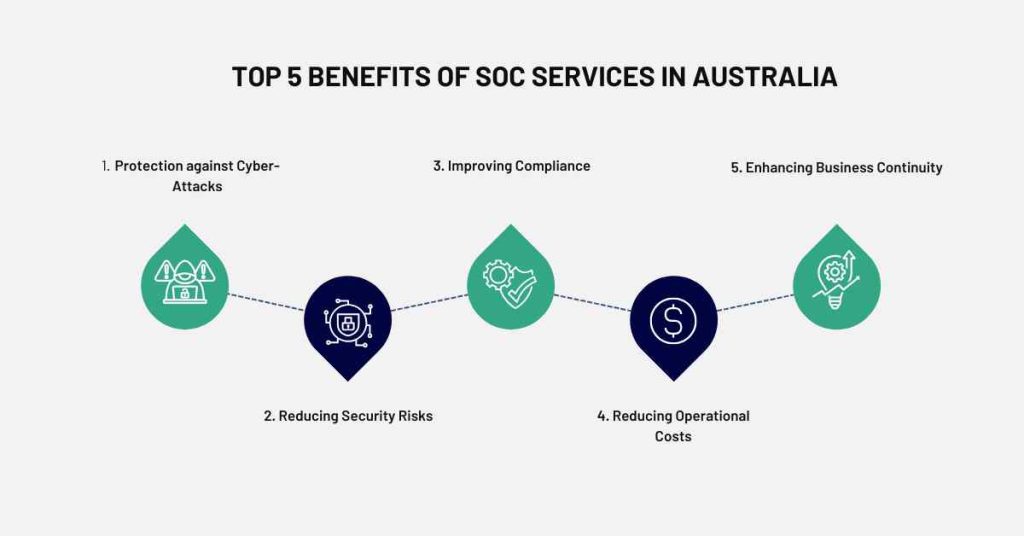
The benefits of SOC services in Australia are numerous and can be seen in various aspects of business operations. Some of the key benefits include:
1. Protection against Cyber-Attacks
SOC services provide an organization with protection against cyber-attacks, minimizing the risk of data breaches, and associated financial losses.
2. Reducing Security Risks
SOC services can help an organization reduce security risks by identifying and mitigating vulnerabilities and providing real-time monitoring and incident response.
3. Improving Compliance
SOC services can help an organization meet its compliance and regulatory requirements, reducing the risk of fines and reputational damage.
4. Reducing Operational Costs
SOC services can help an organization reduce operational costs associated with security operations, such as reducing the need for in-house security staff and minimizing the risk of costly security breaches.
5. Enhancing Business Continuity
SOC services can help an organization ensure business continuity, minimizing the risk of disruptions to business operations, and ensuring that the organization remains operational in the event of a security breach.
Challenges of Implementing SOC Services in Australia
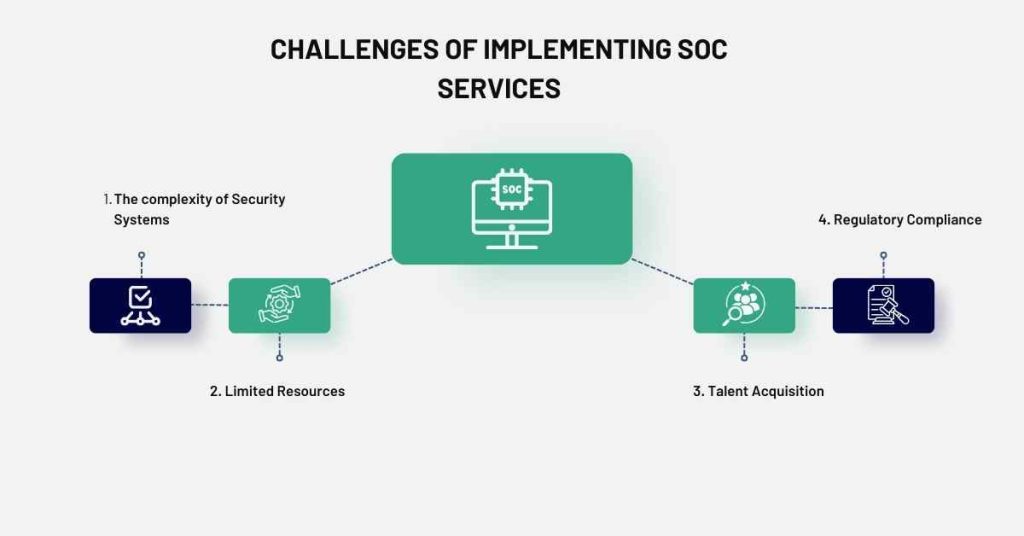
Implementing SOC services in Australia can come with some challenges. Some of the key challenges include:
1. The complexity of Security Systems
The complexity of modern IT systems can make it challenging to implement and manage SOC services effectively.
2. Limited Resources
Small and medium-sized businesses may have limited resources to devote to SOC services, making it challenging to implement and manage these services effectively.
3. Talent Acquisition
Acquiring and retaining skilled security professionals can be challenging, making it difficult to implement and manage SOC services effectively.
4. Regulatory Compliance
Meeting regulatory requirements can be challenging, and SOC services must be implemented and managed in a way that meets these requirements.
Summary
Here is the summary for the blog titled Top 15 Reasons Why Security Operations Center Services Are Important For Businesses In Australia.
- Enhanced Threat Detection
- 24/7 Monitoring
- Expertise and Experience
- Reduced False Positives
- Compliance and Regulatory Requirements
- Proactive Threat Hunting
- Improved Incident Response
- Enhanced Visibility
- Cost Savings
- Managed Security Services
- Threat Intelligence
- Streamlined Security Operations
- Better Decision Making
- Protecting Brand Reputation
- Business Continuity
Conclusion
SOC services are essential for businesses in Australia, providing an additional layer of defence against cyber-attacks and helping to mitigate potential losses.
By implementing SOC services, an organization can enhance threat detection, improve incident response, and reduce security risks. While there are challenges associated with implementing SOC services, the benefits far outweigh these challenges.
As the threat landscape continues to evolve, SOC services will become increasingly important for businesses in Australia, helping to protect them against cyber-attacks and ensure business continuity.
FAQs: Top 15 Reasons Why Security Operations Center Services Are Important For Businesses In Australia
1. What is a Security Operations Center (SOC)?
Ans: A Security Operations Center (SOC) is a centralized unit that continuously monitors and analyzes an organization’s security-related data to identify, contain, and respond to potential security threats. A SOC uses advanced threat detection tools and techniques to provide real-time monitoring and incident response.
2. Why do I need a SOC?
Ans: You need a SOC to protect your organization from cyber-attacks and data breaches. A SOC provides an additional layer of defence against cyber-attacks, reducing the risk of data breaches and associated financial losses.
3. What types of services do SOCs provide?
Ans: SOCs provide a range of services, including security monitoring, incident response, threat intelligence, security analytics, and compliance management. These services help organizations to identify and respond to potential security threats in real time.
4. How does a SOC help with compliance?
Ans: A SOC can help organizations meet their compliance and regulatory requirements by providing real-time monitoring and incident response. SOCs can also help organizations to implement and manage security controls required by regulatory bodies.
5. What is the difference between a SOC and a NOC?
Ans: A SOC (Security Operations Center) is a centralized unit that focuses on security-related issues, while a NOC (Network Operations Center) is a centralized unit that focuses on network-related issues. While there is some overlap between the two, a SOC is specifically designed to provide security-related services.
6. How much does a SOC cost?
Ans: The cost of a SOC can vary depending on the size and complexity of the organization, as well as the level of service required.
7. Can I build my own SOC?
Ans: Yes, you can build your own SOC, but it may not be the most cost-effective or efficient way to manage your security operations. Building a SOC requires significant investment in technology, personnel, and training, and can be complex to manage.
8. What are the benefits of outsourcing my SOC?
Ans: Outsourcing your SOC can provide a range of benefits, including cost savings, access to specialized expertise, and improved scalability. Outsourced SOCs can also provide 24/7 monitoring and incident response, reducing the risk of security breaches.
9. How do I choose the right SOC service provider?
Ans: When choosing a SOC service provider, consider factors such as expertise, experience, technology, and reputation. Ensure that the provider has experience working with organizations of similar size and complexity to yours.
10. What is the future of SOC services in Australia?
Ans: The future of SOC services in Australia is bright, as more organizations recognize the importance of security operations in protecting against cyber-attacks and data breaches. As the threat landscape continues to evolve, SOC services will become increasingly important for organizations in Australia, and we can expect to see more investment in this area in the coming years.


